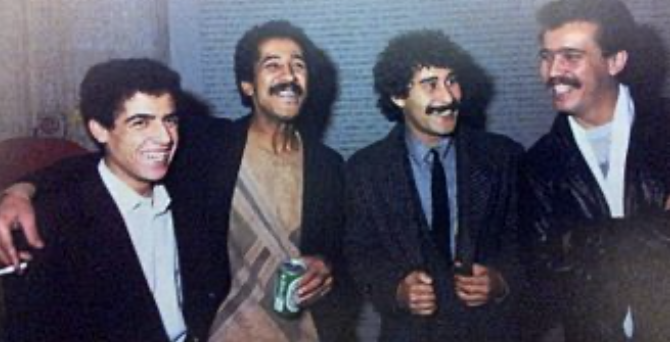Rhythms of Resilience: How Urban Struggles Shaped Raï Music

By: Nissrine Bedda / Arab America Contributing Writer
From the classic hits “Didi,” “Aïcha,” “1, 2, 3 Soleil,” and “C’est la vie,” the infamous Algerian-Raï singer Cheb Khaled was well-known for his joyful spirit, especially during performances. It is widely recognized that Cheb Khaled is the king of Raï music. Originating from the traditions of the Middle East and North Africa, Raï music features soulful, melodic rhythms and heartfelt lyrics that come together to create a connection among people around the world. Oran, Algeria, was once affectionately dubbed the “little Paris” of North Africa, a vibrant hub where cultures intertwined beautifully. It’s no wonder that Rai music flourished here, drawing its rich influences from this dynamic city that unites people through the power of music.
Going Beyond “Aïcha”
The city of Oran raised a young boy named Cheb Khaled, not only connecting him deeply to his Algerian heritage, but raising wonders beyond North Africa. There’s a secret touch that differentiates Rai music compared to other North African genres which is the mix of poetry , classical notes, and the raw moments that impact someone living in an urbanized world that touch the hearts of many who have gone through heartbreak, grief, separation, tragedy, or all of the above. What started with tunes that replicated American blues turned into a culmination of rock music and North African synth that would take Rai music to a completely different level. Cheb Khaled, one of the first to start this experimentation process, succeeded with the birth of “Aïcha” in 1996. The song, originally composed about a man professing his love and admiration for a woman named Aïcha by promising her pearls, jewels, poems, and other luxuries and romantic things, which she declines, would reach world records which eventually sparked the rise for the famous Algerian singer.
How American Blues meets Raï
By the time Khaled was 10, he played several instruments, including the accordion, guitar, and harmonica. In the 1980s Khaled and other singers added drum machines, synthesizers, and electric guitars to the mix; they also adopted the name Cheb (“Young”) to distinguish themselves and their music from their predecessors, you know, singers like Cheb Mami, Cheb Bilal, Cheb Hasni, and the list goes on.Cheb Khaled would later go on to explore out of his comfort zone, and onto Europe, to embark new adventures with French producers and songwriters. You may be thinking, where does the Algerian element go from there? Does it suddenly disappear? And it simply doesn’t stop there! In France especially, Algerians make up about 12.5% of the total immigration population in France. Living in a cosmopolitan city like Paris would only connect him more to his “home away from home” with an Algerian community who were living in the struggle of identity while coming from a different society from East to West.
Urban Struggle
Still, one thing remained true, Rai music would keep the Algerian heritage together, especially when it came to its diaspora. The great singer once said, “In Raï, you sing your true feelings. The lyrics come straight from your life, from your heart. It’s about real life, not life as it’s supposed to be.” While Raï music can get a bad rep at times amongst North Africans, especially men, who may have the idea in their head that its almost too cringe to speak your emotions out about a certain heartbreak, the genre certainly allowed others to recognize the social change that was occurring amongst the North African community that would later allow for people to open up, cherish, and savor the lyrics crying and shouting to them out loud while dancing the night away with friends.
How Raï has Evolutionized
Rai music evokes memories and feelings of nostalgia for the Maghreb diaspora, but it’s fascinating to witness how these lyrics have evolved over the years. They remain deeply relatable, creating a powerful space for connection and resonance through their timeless themes. You may have heard of DJ Snake, the famous Algerian DJ that has collaborated with artists like Justin Bieber, Selena Gomez, Ozuna, and Major Lazor with his hit “Lean On” back in 2015. DJ Snake, originating from Paris France with Algerian roots, would soon find a way of embracing his Algerian lineage growing up in Western society and pay an homage to the bled (“homeland” in Darija).
With the release of his electrifying hit “Disco Maghreb” in 2022, he masterfully blended elements of Raï, pop, and regaada—a traditional North African dance—creating a vibrant homage to his roots. Embracing these influences, he invites the community to join him on a thrilling journey that breaks away from Western norms, introducing the rich rhythms of North Africa to Western earbuds instead.
I leave you with this thought: I can’t help but wonder: if it weren’t for the young singer Cheb Khaled from Oran, who experimented with traditional elements of the Maghreb while embarking on a new journey in France, where would Raï music be today?
Check out our blog!








